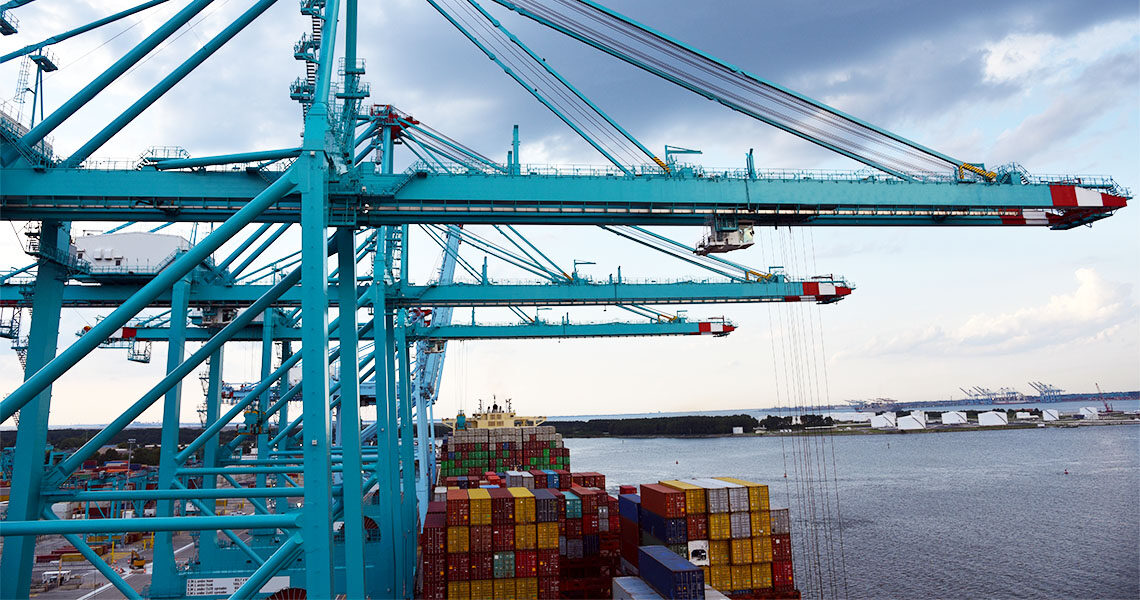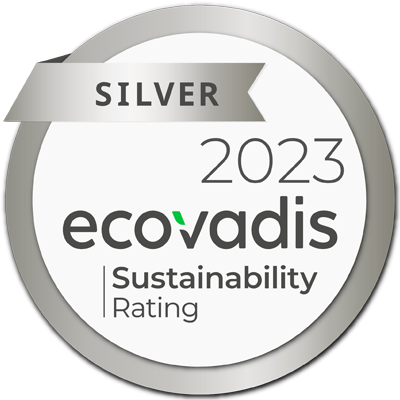- Port Name: Virginia Port
- Location: Virginia, USA
- Owner: AMP MAERSK
- Cranes Maker: Konecranes
- Reeling Manufacturer: Cavotec SPECIMAS
- Cable: TratosFlex ESDB
- Installation Date: 2009
- Speed: 300 m/m
Tratos & Virginia Port cooperation
Tratos has supplied its Tratosflex-ESDB® cable to be used in the cranes of Virginia Port. Tratosflex-ESDB is ideal for container cranes such as these, which operate at speeds up to 300 mt/m, as it has been designed to combat the common problem of twisting that affects cables reeling at high speed.
The terminal’s all-electric crane inventory includes six super post-Panamax ship-to-shore cranes, 30 semi-automated rail-mounted gantry yard cranes (RMGs), and two rubber tire gantry cranes (RTGs) with electric spreader bars. Twenty shuttle trucks transport cargo from the dock to the stack area. Fewer diesel engines and use of on-road engines in 62 o -road terminal vehicles contribute to signi cantly reduced levels of particulate matter and nitrous oxide emissions. In addition, electric spreader bars eliminate hydraulic spills.
Virginia Port Authority
The Virginia Port Authority’s operations are provided by Virginia International Terminals, LLC (VIT), a single-member limited liability company wholly owned by the Virginia Port Authority (VPA). In addition, Hampton Roads Chassis Pool, LLC (HRCP II), on behalf of and wholly owned by VIT, operates and manages the intermodal chassis and empty container yards.
In 2019, CNBC ranked Virginia as the #1 state for business, and The Port of Virginia plays a key role in Virginia’s ability to serve those businesses. In a larger sense, The Port of Virginia is doing everything necessary to become the U.S. East Coast’s leading gateway for global trade for the next several decades, and to make Virginia the #1 place for businesses in the country.
Between 2015 and 2025, the port will have invested $1.5 billion in its infrastructure – creating a network of six terminals that can handle any type of cargo. Dredges hit our waters in late 2019 and our deepening and widening efforts are in full swing. By 2024, we’ll once again be the deepest port on the US East Coast with 55’ channels and two-way traffic for the largest vessels calling our coast.
Didi you know?
The Port of Virginia moves cargo through world-class facilities and transports to and from markets around the globe, carrying the goods and supplies that manufacturers, corporations, and individual consumers use in their everyday lives. This cargo is moved by way of:
- 6 Terminals
- 1,864 acres
- 19,885 L.F. of berth
- Up to 50’ deep berths
- 30 miles of on-dock rail
The Port of Virginia is a hub port; an important distinction for the shipping public. Nearly 30 international shipping lines offer direct, dedicated service to and from Virginia, with connections to 200+ countries around the world. In an average week, more than 40 international container, breakbulk and roll-on / roll-off vessels are serviced at our marine terminals.
Tratos supports sustainable developments of ports infrastructure
Tratos is very pleased to supply its high-quality cables to the ports around the world. In doing so, Tratos supports the global endeavours of port authorities in upgrading and improving their operational capabilities, which contributes to the sustainable development of ports and achieving the 17 UN Global Goals.
With this project Tratos has supported:
#Envision2030 Goal 3: Good Health and Well-being
- By 2030, substantially reduce the number of deaths and illnesses from hazardous chemicals and air, water and soil pollution and contamination
#Envision2030 Goal 8: Decent Work and Economic Growth
- Achieve higher levels of economic productivity through diversification, technological upgrading and innovation, including through a focus on high-value added and labour-intensive sectors
- Improve progressively, through 2030, global resource efficiency in consumption and production and endeavour to decouple economic growth from environmental degradation, in accordance with the 10-year framework of programmes on sustainable consumption and production, with developed countries taking the lead
#Envision2030 Goal 11: Sustainable Cities and Communities
- By 2030, significantly reduce the number of deaths and the number of people affected and substantially decrease the direct economic losses relative to global gross domestic product caused by disasters, including water-related disasters, with a focus on protecting the poor and people in vulnerable situations
#Envision2030 Goal 14: Life Below Water
Targets
- By 2025, prevent and significantly reduce marine pollution of all kinds, in particular from land-based activities, including marine debris and nutrient pollution
- Minimize and address the impacts of ocean acidification, including through enhanced scientific cooperation at all levels










